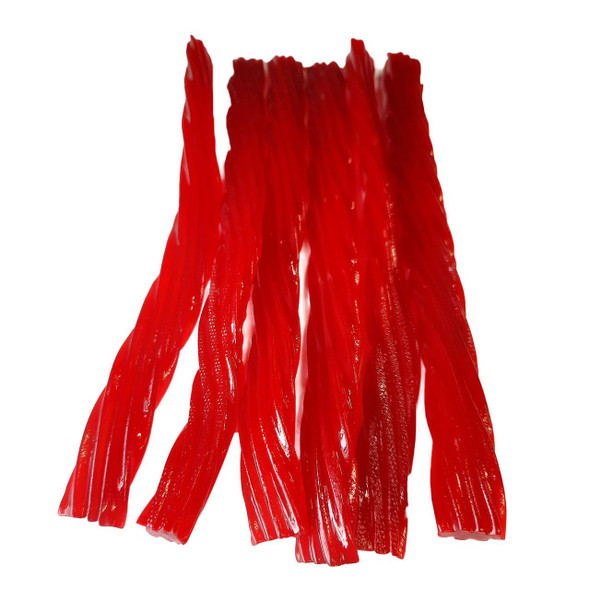- Product
- Qty in Cart
- Quantity
- Price
- Subtotal
-

Claey's Sanded Licorice Drops (9lbs)
$45.99Claey's Sanded Licorice Drops 9 lbs bulkThese candies have a lively Licorice flavor, and are sanded with sugar for sweetness. They come in 6-oz bags, 24 to a case. Weight: 9 lbs Availability: Licorice Drops usually ship in one or two business days. This... -

Wiley Wallaby Australian Style Black Licorice(10lb)
$51.99Wiley Wallaby Australian Style Black Licorice(10lb) Australian Style Black Licorice is different from other licorice in several key ways. First, the core is solid licorice; no hollow licorice in Australian Style Black Licorice. Second, it is softer than... -

Wiley Wallaby Australian Style Red Licorice(10lb)
$51.99Wiley Wallaby Australian Style Red Licorice(10lb)Made in the USA, Australian Style Red Licorice departs from products otherwise known as licorice. Give your customers a pleasant surprise and possibly a new eating experience with snack-sized Australian... -


Kenny's Jumbo Licorice Twists, 3 Flavors (36/8oz:18lb)
$70.99Kenny's Jumbo "Licorice" Twists, 3 Flavors (36/8oz:18lb) Kenny's Jumbo Licorice Twists come in three flavors: Red Raspberry, Cherry, or Black. Get 18lbs of just one flavor, or 6lbs of each. The case consists of 36 8oz packages for individual giving or... -

Twizzlers Black Licorice Twists Twizzlers(12lb)
$71.99Twizzlers Black Licorice Twists(12lb) Twizzlers licorice twists include natural flavorings like licorice extract and anise oil in one fat-free, licorice rope that tastes as good as ever! Contents:12lb, in 12 bags of 1 pound each. Availability: Licorice... -

Gerrit Verburg Black Licorice Wheels(17.6lb)
$90.99Gerrit Verburg Black Licorice Wheels(17.6lb)These licorice wheels are actually made by winding up a long, slender rope of licorice into a wheel. Unwinding it is the fun part for some of your customers, and if they like black licorice, you almost can't... -

Gerrit Verburg Strawberry Licorice Wheels(17.6lb)
$90.99Gerrit Verburg Strawberry Licorice Wheels(17.6lb)Bright red licorice strawberry wheels stand out in the crowd of licorice. First of all, they are bright, not black. Then, they are strawberry flavored! Can't be beat!!! Contents:17.6lb, in four bags of 4.4... -

Kenny's Black Licorice Bites (25lb)
$94.99Kenny's Black Licorice Bites (25lb)Kenny's Black licorice-bites make everyone happy, whether they are named Kenny, or Doris, or Choteau. Kenny's Black Licorice Bites are great to have on hand for fun gatherings. Contents:25lb Availability:Licorice Bites... -

Kenny's Cherry Licorice Bites(25lb)
$94.99Kenny's Cherry Licorice Bites(25lb)Kenny's Cherry licorice-bites are the short version of red licorice ropes. When you want to provide red licorice but in a form that allows eating with dignity, Kenny's Cherry licoricebites are the bulk solution that... -

Darrell Lea Australian Black Licorice(15.4lb)
$108.99Darrell Lea Australian Black Licorice(15.4lb)Darrell Lea Australian Black Licorice is fast becoming an American favorite candy. Soft and chewy black licorice pieces are a classic treat from 'down under'. . Contents:15.4lb Availability:Darrell Lea... -

Darrell Lea Australian Red Licorice(15.4lb)
$108.99Darrell Lea Australian Red Licorice(15.4lb)Australian Red Licorice can't be beat. Full of old fashioned red licorice flavor, they are fast becoming as much of an American favorite as they already were an Australian favorite. Stock up now. Contents:15... -
Sale
 Sale
SaleTwizzler Strawberry Twists Twizzlers(24lb)
$143.99Now: $129.95Twizzlers Strawberry Twists(24lb) Twizzlers strawberry twists feature a couple of luscious summer strawberries on the appropriately bright red packaging. Contents:24lb, in 24 bags of 1lb each. Availability: Strawberry twists usually ship in one or two...

Licorice (also spelled liquorice) is the sweet flavor extracted from the root of Glycyrrhiza glabra. Anise is a similar flavor, but botanically unrelated. The magic of licorice is yours with bulk amounts of chewy licorice laces, bites, beans, bites, drops, ropes and all sorts for added variety. Between the brightly-hued mixes and single-color selections, a complex of colors awaits the palate and the eyes. Individually wrapped options are available for treats to share or to offer in a candy bowl. The large number of licorice choices keeps liquorice lovers busy any time, with a favorite topic.
How is Licorice Made?
First of all, it's important to distinguish between real licorice and imitation licorice. Red licorice is a misnomer. The red product that is called licorice is not a "true" licorice because of what it is made from and its flavor (typically strawberry, cherry, or another 'red' color). Instead, true licorice is the black stuff, made from extracts of the roots of the licorice plant "Glycyrrhiza glabra" with the well-known, distinctive licorice flavor.
Once we understand which is the 'real' licorice, then it is time to learn how it is made. The basic process begins with licorice root extract, sugar, and a binder such as starch (flour) or gelatin or a combination. The three ingredients are dissolved in water and then heated to about 275 °F. To achieve specific shapes, upon completion, they may be poured into molds. Following formation, they can be wrapped. Licorice comes in an almost infinite variety of sizes and shapes, from a meter-long novelty at a fair in Finland to wheels and other shapes better known on this side of the Atlantic. Gumballs.com is a great place to stock up on both "real" black licorice in several different forms as well as the red licorice that is enjoyed so much in this country.
Why Are There Different Spellings: Licorice/Liquorice?
The two different spellings are regionalisms. "Licorice" is the spelling most commonly used in the USA; "liquorice" is "British English" for the same product. It is likely that the two different spellings have arisen as an expression of historical independence. Regardless of how you spell it, Gumballs.com sells bulk licorice candy ! Stock up on it as soon as you can!
The pop quiz mentioned elsewhere on gumballs.com: Who invented the first mass-produced game of the type named in the category in which the answer is found?

